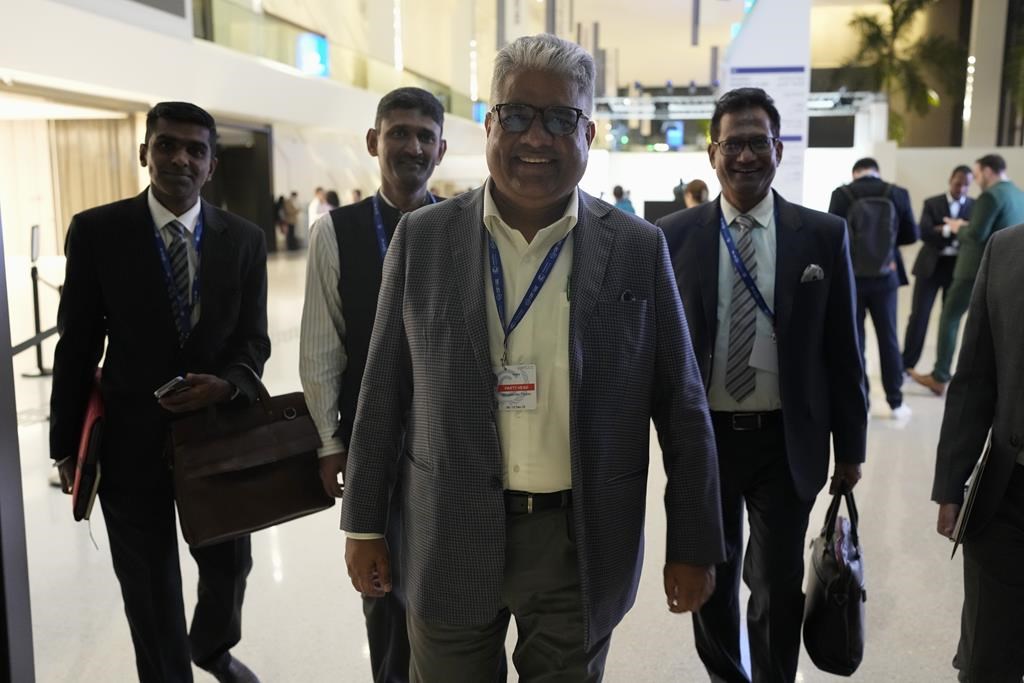At COP28, sticking points remain on fossil fuels and adapting to climate as talks near crunch time

Posted Dec 10, 2023 12:45:16 AM.
Last Updated Dec 10, 2023 12:40:34 PM.
DUBAI, United Arab Emirates (AP) — Negotiators have been urged to narrow down their options so they can agree on how to save Earth from disastrous levels of warming and help vulnerable societies adapt to weather extremes as the clock runs down on United Nations climate talks.
COP28 President Sultan al-Jaber told journalists on Sunday that negotiators were “making good progress,” just not fast enough. So he borrowed from Arab culture and convened a majlis on Sunday afternoon, a new format for talks where he was bringing ministers from all countries to sit together for a meeting, more as a conversation. He begged them to leave their objections and talking points behind.
“I want everyone to come ready to be flexible and to accept compromise,” he said, as protesters could be heard nearby calling for the end of fossil fuels. “Failure or lack of progress or watering down my ambition is not an option.”
The new format seemed to work better than other methods, getting frank and deep discussions, said Trinidad and Tobago’s Kishan Kumarsingh.
“I see it as being designed to draw us out of our comfort zones and have a free and candid and heart-to-heart exchange,” Bangladesh climate envoy Saber Chowdhury said. “The idea was that we come into it with questions, concerns and fears and come out of it with solutions.”
Wopke Hoekstra, the EU climate commissioner, repeated calls for a fossil fuel phase-out at the majlis.
Hoekstra said he noticed “a super majority” of countries, representing the vast majority of the world supporting strong language to phase-out fossil fuels: “Their statements are in line with scientific advice and it is our obligation to make sure we follow them.”
Earlier Sunday, a new draft for an agreement on global adaptation goals — which will determine how poor countries will brace themselves for climate change-fueled weather extremes like drought, heat and storms — was released.
The new draft “presents the skeleton of what could be a reasonable framework” on how to adapt to climate change, said Ana Mulio Alvarez of climate think tank E3G, but to be effective, adapting to climate change “requires developed countries to provide support to developing countries” to actually enact plans, which wasn’t in the draft.
Sticking points for the Global Stocktake — the part of the negotiations that assesses where the world is at with curbing warming and how countries can stick to climate goals — are along familiar lines.
“It’s very clear that there is a group of countries here that don’t want to phase out fossil fuels,” said German climate envoy Jennifer Morgan. Small island states, Latin American countries and European countries are pushing for a phase-out, but other nations are “still far apart” Morgan said late Saturday.
Rachel Cleetus of the Union of Concerned Scientists told journalists Sunday that “the big laggards, the ones being obstinate, is definitely Saudi Arabia and the OPEC countries,” the powerful oil cartel.
But Brandon Wu of ActionAid USA also criticized America’s plans to expand oil and gas production.
“We should not ignore the fact that the United States has the single largest oil and gas expansion plans of any country in the world by far. It’s not even close,” Wu said.
Democratic U.S. Sen. Ed Markey from Massachusetts, acknowledged the Ukraine war boosted domestic natural gas production because “the LNG industry in the United States saw an opportunity to dramatically expand its footprint.”
He added: “We cannot preach temperance from a bar stool. We cannot tell the rest of the world you should move toward a renewable energy future if we ourselves are spreading this LNG poison around the world.”
Meanwhile, an analysis by the Paris-based International Energy Agency on Sunday found that the several pledges made at COP28 to move to clean energy — over a hundred countries promised to triple renewables and double energy efficiency and several oil and gas companies pledged to slash their methane emissions — were nowhere near what’s needed to cap warming to to 1.5 degrees Celsius (2.7 degrees Fahrenheit) since preindustrial times.
If countries and companies kept their promises, it would result in around four gigatons fewer of carbon pollution globally by 2030, the report said. But that’s only about 30% of the “emissions gap” — the difference between how much the world is currently emitting and how much it can emit if it’s to meet its climate goals.
And that’s only if countries and companies actually stick to their promises.
Bangladesh’s Chowdhury expressed doubt that the pledges made would be met.
“Countries make pledges, they are not delivered upon,” he said. “We talk about emissions gap, adaptation gap, but the most important gap is the gap in solidarity and trust.”
Lisa Fischer, program lead at E3G, said the oil and gas initiatives already announced “are just tinkering around the edges” of the climate problem.
Fischer and others worried that while countries seem to be warming up to language for a phase-out of fossil fuels, there is likely to be loophole language — the world “unabated” before fossil fuels — that leaves options for burning of oil and gas but somehow capturing the pollution, something that is tricky and expensive. Key will be how “unabated” will be defined, she said.
Some observers on Sunday were cautiously optimistic about the progress so far, with Kaisa Kosonen of Greenpeace International saying the talks were “close to making history.”
“Never before have I seen this level of pressure, with people saying let’s just do it,” Kosonen said.
The talks even received attention at the Vatican, as Pope Francis on Sunday asked the public for prayers that the COP28 meeting “achieves good results for the care for our common home and to protect populations.”
___
This story has been corrected to show that a new draft on adaptation is not the first version released of the text.
___
Associated Press journalists Jamey Keaten, Olivia Zhang, David Keyton and Joshua A. Bickel in Dubai and Frances D’Emilio in Rome contributed to this report. Gaurav Saini from The Press Trust of India also contributed.
___
Associated Press climate and environmental coverage receives support from several private foundations. See more about AP’s climate initiative here. The AP is solely responsible for all content.
Sibi Arasu, Seth Borenstein And Jon Gambrell, The Associated Press








